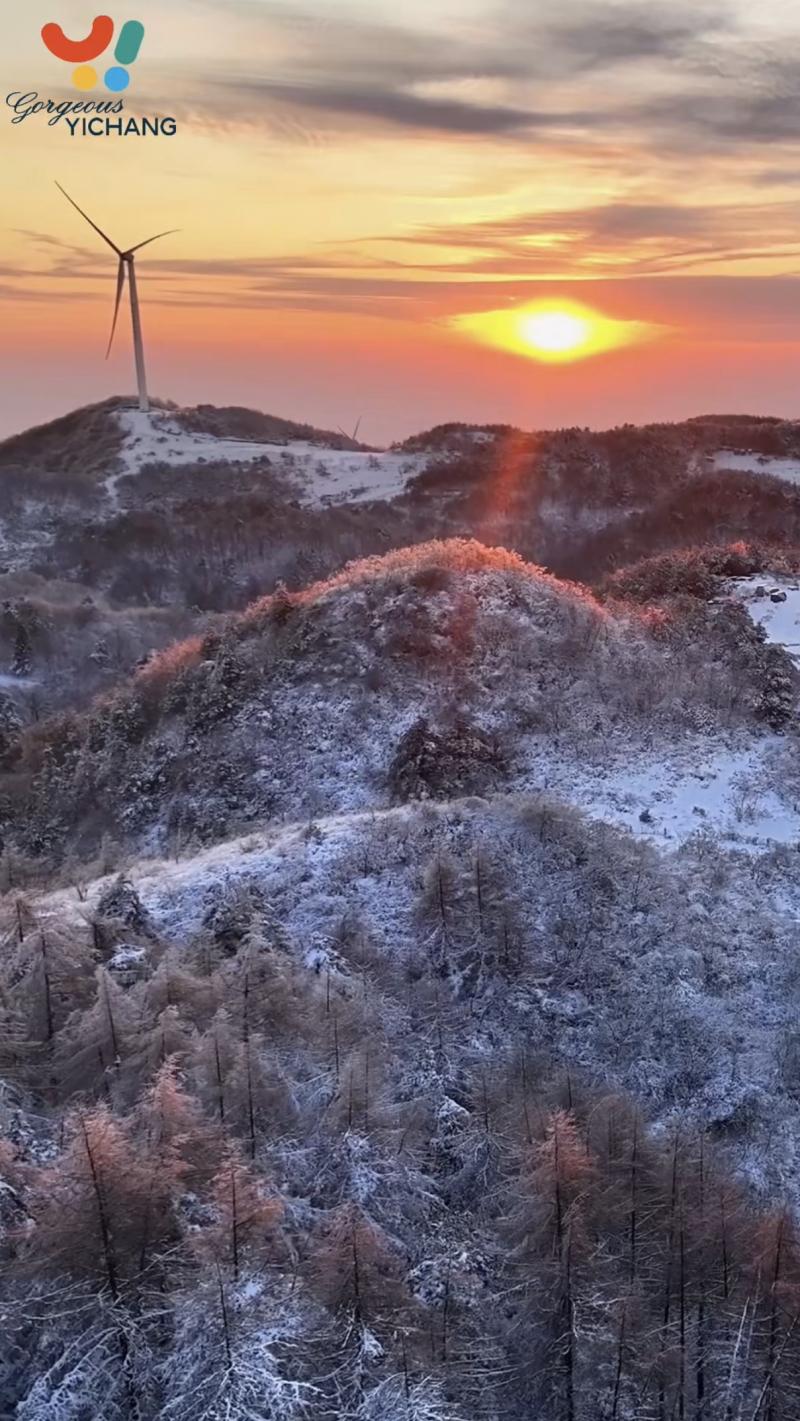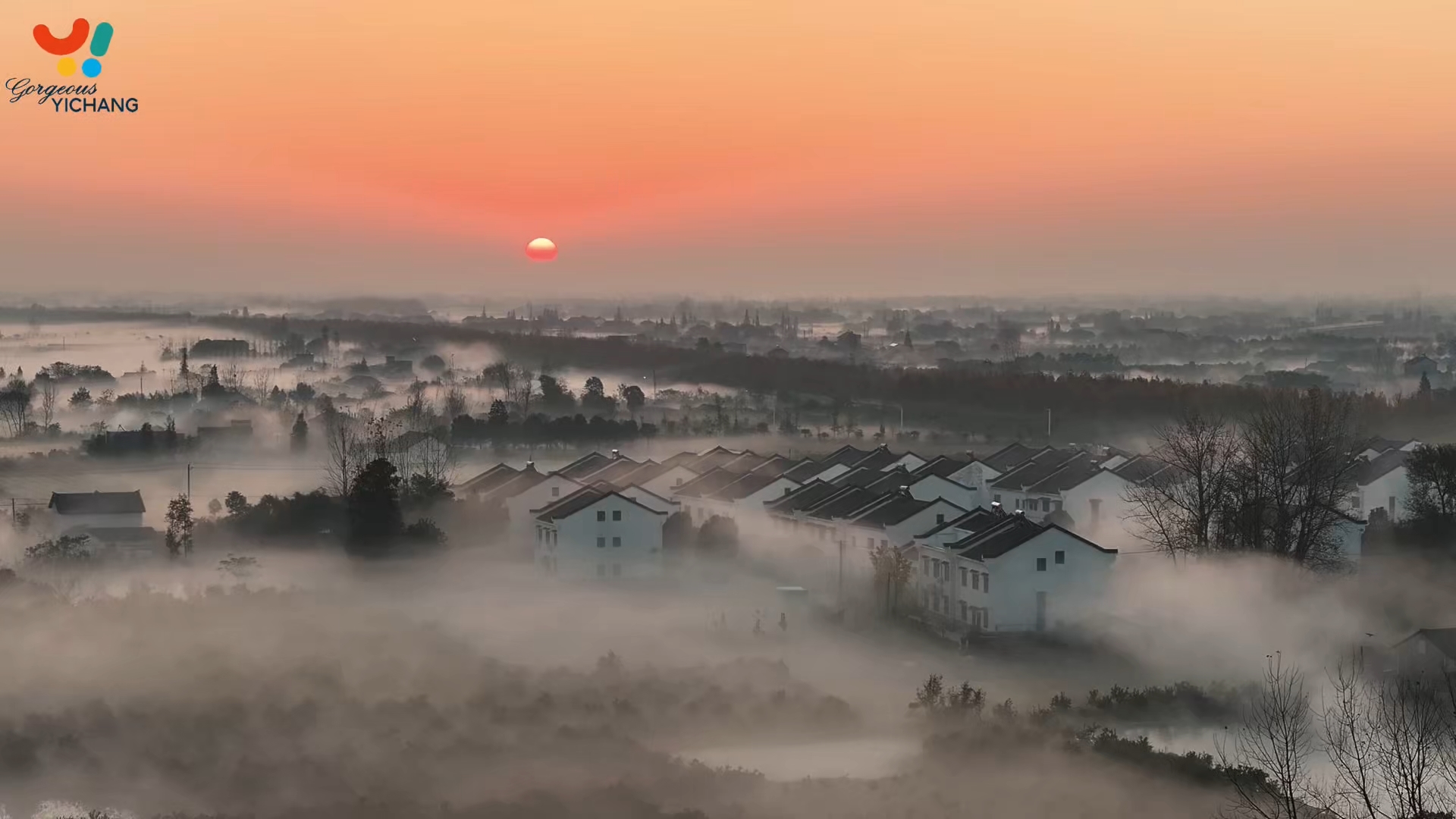Dam cleanup team helps protect Yangtze
2024-01-03 13:01:09
By LIU KUN in Wuhan and ZOU SHUO | China Daily | Updated: 2024-01-03 09:02
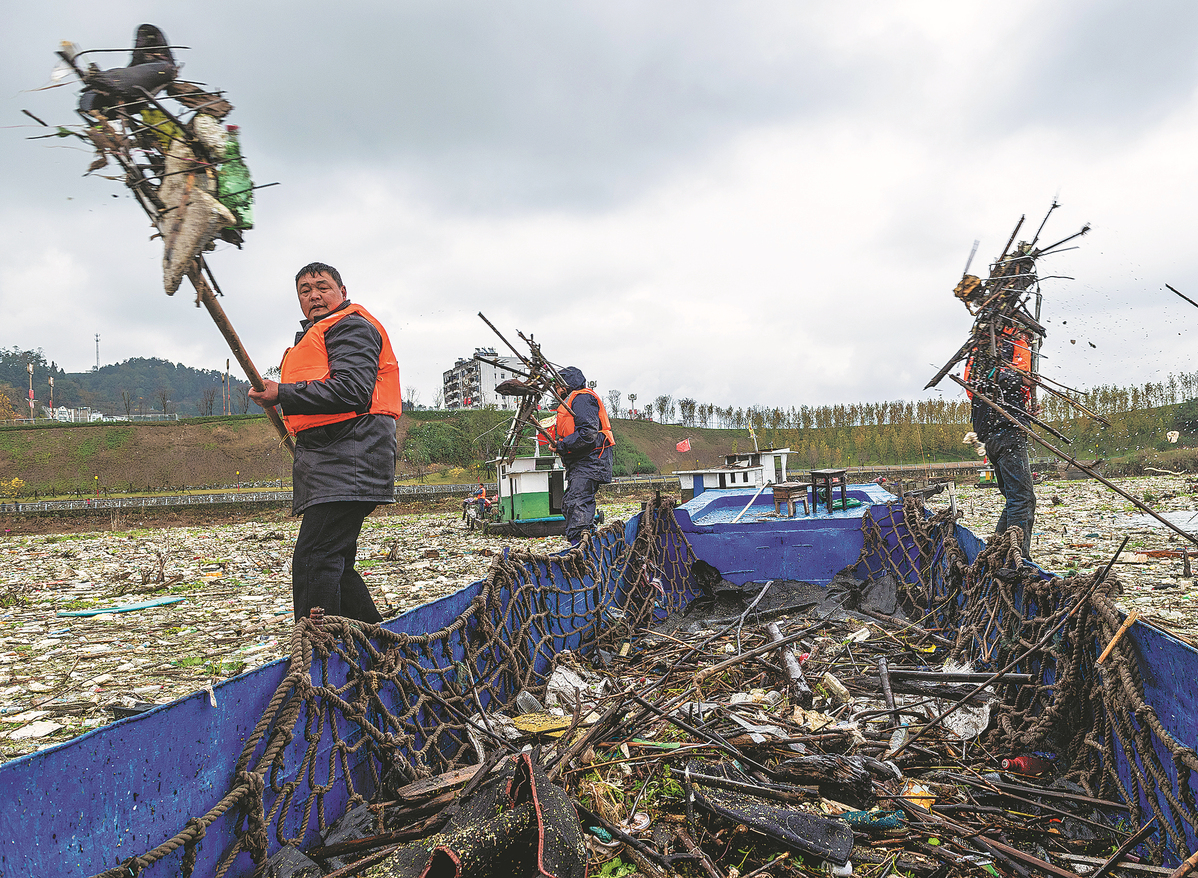
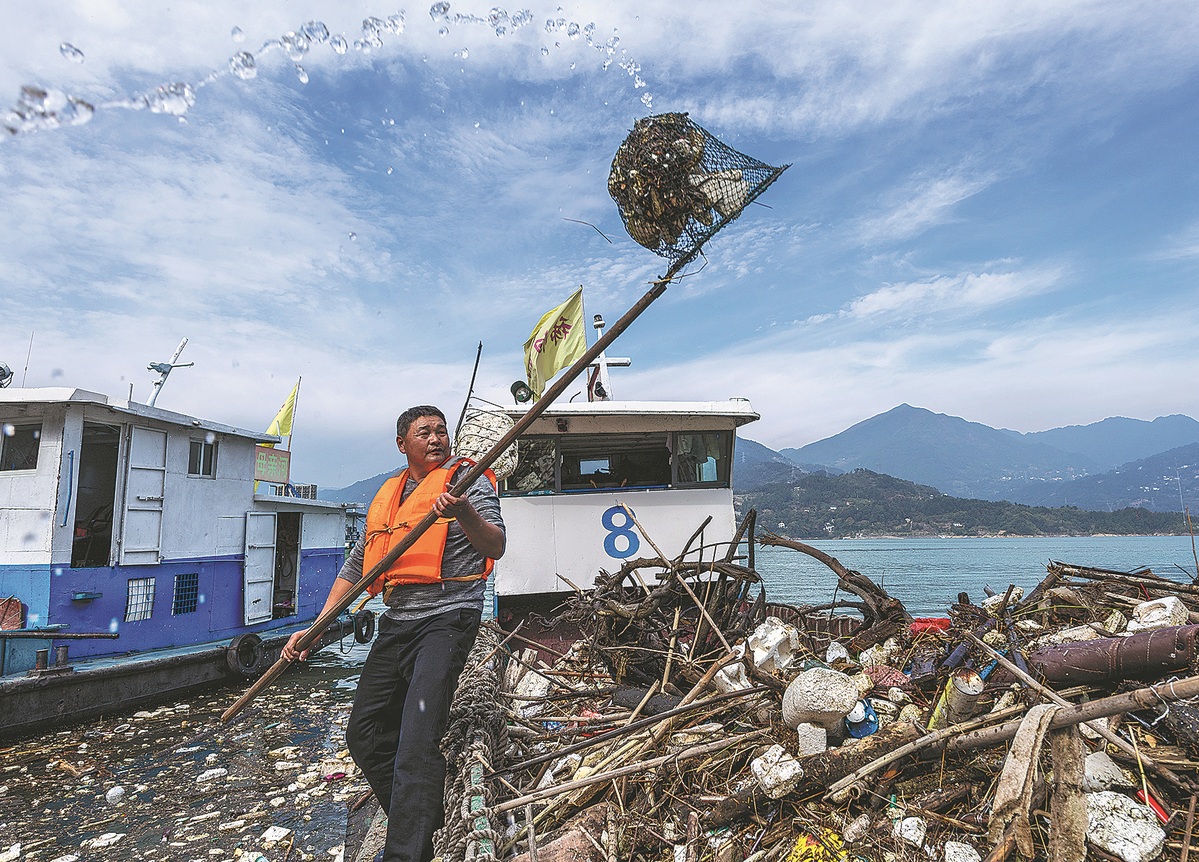 During summer, temperatures on deck can rise to well above 50 C. CHINA DAILY
During summer, temperatures on deck can rise to well above 50 C. CHINA DAILY
Fu Min, a member of the floating object removal team, said Zhou works very hard and is very understanding.
When the team is removing floating objects in faraway places, Zhou brings them lunch, she said.
Zhou said he had noticed a marked improvement in the local environment.
"When the dam first started to store water, there was a large amount of floating objects in Zigui county — almost about one meter thick — but now there's only a thin layer," he said.
The county has invested 40 million yuan to build a waste disposal device to deal with floating objects in the river and the local government has also built two automatic mechanical boats and a floating crane to remove heavy objects.
Zhou said his daughters often give him money and try to persuade him to retire and live a more relaxed life, but he has continued to refuse their entreaties.
"I do not choose the work for the money and as long as the Yangtze River needs me, I will continue until I cannot do so physically," he said.

Zhou Gonghu (left) cleans up floating objects with his teammates on the section of the Yangtze River in Zigui county, Hubei province. CHINA DAILY
Removing floating debris from river safeguards environment at world's largest hydropower project
For the past 17 years, Zhou Gonghu and his team have been the Yangtze River's final guardians above the Three Gorges Dam, the world's largest hydropower project.
They are in charge of cleaning up floating objects in the section of the river that flows down to the dam.
They have removed more than 45,000 metric tons of floating objects from the river as it passes through Hubei province's Zigui county, safeguarding the dam and the environment.
Zhou, 61, said all his ancestors lived along the Yangtze, so he has a special feeling for the "mother river".
After graduating from high school in 1980 at the age of 18, he decided to join the army to realize his childhood dream of becoming a soldier. He received seven awards for good performance before ending his time in the army in 1985 to return to his hometown and work for a local company.
But the company went bankrupt in 2000 and he was laid off. Two years later, he founded a construction team that allowed him to earn around 100,000 yuan ($14,000) a year, a high income for villagers in the county.
As the dam started to store water for generating electricity, the water flow slowed and a large quantity of floating objects circled around the reservoir.
The local government decided to organize a team to remove them before they reached the dam.
For the past 17 years, Zhou Gonghu and his team have been the Yangtze River's final guardians above the Three Gorges Dam, the world's largest hydropower project.
They are in charge of cleaning up floating objects in the section of the river that flows down to the dam.
They have removed more than 45,000 metric tons of floating objects from the river as it passes through Hubei province's Zigui county, safeguarding the dam and the environment.
Zhou, 61, said all his ancestors lived along the Yangtze, so he has a special feeling for the "mother river".
After graduating from high school in 1980 at the age of 18, he decided to join the army to realize his childhood dream of becoming a soldier. He received seven awards for good performance before ending his time in the army in 1985 to return to his hometown and work for a local company.
But the company went bankrupt in 2000 and he was laid off. Two years later, he founded a construction team that allowed him to earn around 100,000 yuan ($14,000) a year, a high income for villagers in the county.
As the dam started to store water for generating electricity, the water flow slowed and a large quantity of floating objects circled around the reservoir.
The local government decided to organize a team to remove them before they reached the dam.
 During summer, temperatures on deck can rise to well above 50 C. CHINA DAILY
During summer, temperatures on deck can rise to well above 50 C. CHINA DAILYAfter learning about the plan, Zhou thought about joining the team. However, his family opposed the notion as the construction business was going well.
"I told my family that I was born and raised along the Yangtze River," he said. "I eat its fish and drink its water, so it is my responsibility to protect the river.
"People cannot only think about making money in their life, but also need to do something meaningful."
He said his two daughters were already grown up and the family's expenses were not so high, which meant the salary from cleaning the river was sufficient.
In April 2006, he gave up the construction business, bought a boat with friends and founded the dam's first debris removal team with a dozen villagers.
Since then, he has risen at 5:30 am and returned home after dark. In order to motivate his team members, he always does the hardest job.
During winter, he is the first to jump into the freezing water to remove sticks obstructing the boat's propeller.
"As I managed a squad of soldiers well in the military, I can also manage a team of cleaning 'frogmen'," he said.
During peak times, there are almost 100 frogmen removing objects from the river in Zigui, and more than 20 retired soldiers have joined Zhou's team.
He admits that removing the floating objects is hard work. During summer, temperatures on deck can rise to well above 50 C. Meanwhile, he needs to remove almost 20 kilograms of objects from each scoop of river water, a process he repeats nearly 1,000 times a day.
In November 2020, due to a change in wind and current, almost 40,000 cubic meters of floating objects were found at a river bend in the county, equal to the amount normally scooped up by the team in a whole year.
Zhou organized more than 30 boats and 100 people to remove the objects. They worked for more than 40 days and removed more than 2,000 tons of objects.
During that time, his mother had a cerebral hemorrhage, but Zhou stayed at his post. His mother stayed at the hospital for three months, and was looked after mostly by his wife and brothers. Zhou only had time to check up on her at night after work.
He said he felt indebted to his wife, who had taken on most of the responsibility for managing the family's affairs.
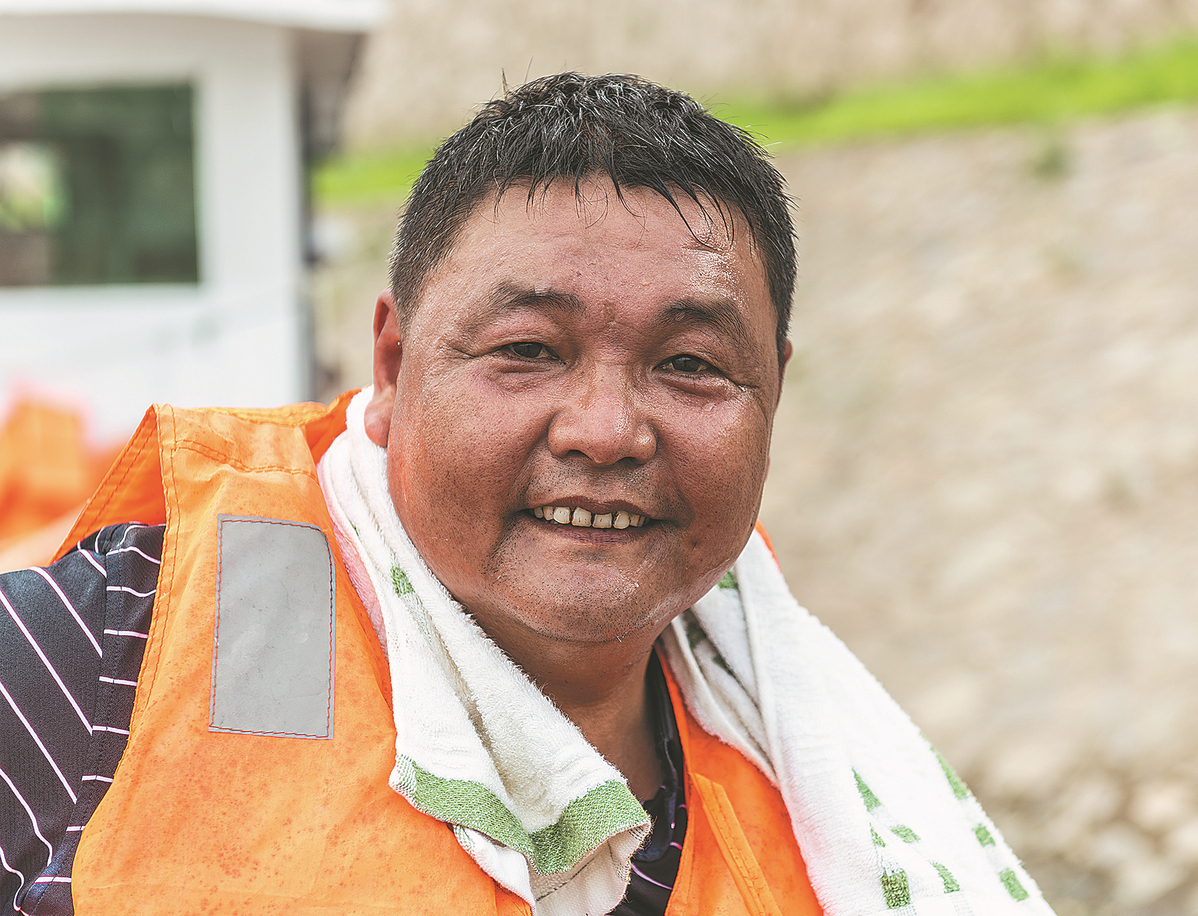
"I told my family that I was born and raised along the Yangtze River," he said. "I eat its fish and drink its water, so it is my responsibility to protect the river.
"People cannot only think about making money in their life, but also need to do something meaningful."
He said his two daughters were already grown up and the family's expenses were not so high, which meant the salary from cleaning the river was sufficient.
In April 2006, he gave up the construction business, bought a boat with friends and founded the dam's first debris removal team with a dozen villagers.
Since then, he has risen at 5:30 am and returned home after dark. In order to motivate his team members, he always does the hardest job.
During winter, he is the first to jump into the freezing water to remove sticks obstructing the boat's propeller.
"As I managed a squad of soldiers well in the military, I can also manage a team of cleaning 'frogmen'," he said.
During peak times, there are almost 100 frogmen removing objects from the river in Zigui, and more than 20 retired soldiers have joined Zhou's team.
He admits that removing the floating objects is hard work. During summer, temperatures on deck can rise to well above 50 C. Meanwhile, he needs to remove almost 20 kilograms of objects from each scoop of river water, a process he repeats nearly 1,000 times a day.
In November 2020, due to a change in wind and current, almost 40,000 cubic meters of floating objects were found at a river bend in the county, equal to the amount normally scooped up by the team in a whole year.
Zhou organized more than 30 boats and 100 people to remove the objects. They worked for more than 40 days and removed more than 2,000 tons of objects.
During that time, his mother had a cerebral hemorrhage, but Zhou stayed at his post. His mother stayed at the hospital for three months, and was looked after mostly by his wife and brothers. Zhou only had time to check up on her at night after work.
He said he felt indebted to his wife, who had taken on most of the responsibility for managing the family's affairs.

Zhou after a long work day. CHINA DAILY
Fu Min, a member of the floating object removal team, said Zhou works very hard and is very understanding.
When the team is removing floating objects in faraway places, Zhou brings them lunch, she said.
Zhou said he had noticed a marked improvement in the local environment.
"When the dam first started to store water, there was a large amount of floating objects in Zigui county — almost about one meter thick — but now there's only a thin layer," he said.
The county has invested 40 million yuan to build a waste disposal device to deal with floating objects in the river and the local government has also built two automatic mechanical boats and a floating crane to remove heavy objects.
Zhou said his daughters often give him money and try to persuade him to retire and live a more relaxed life, but he has continued to refuse their entreaties.
"I do not choose the work for the money and as long as the Yangtze River needs me, I will continue until I cannot do so physically," he said.

